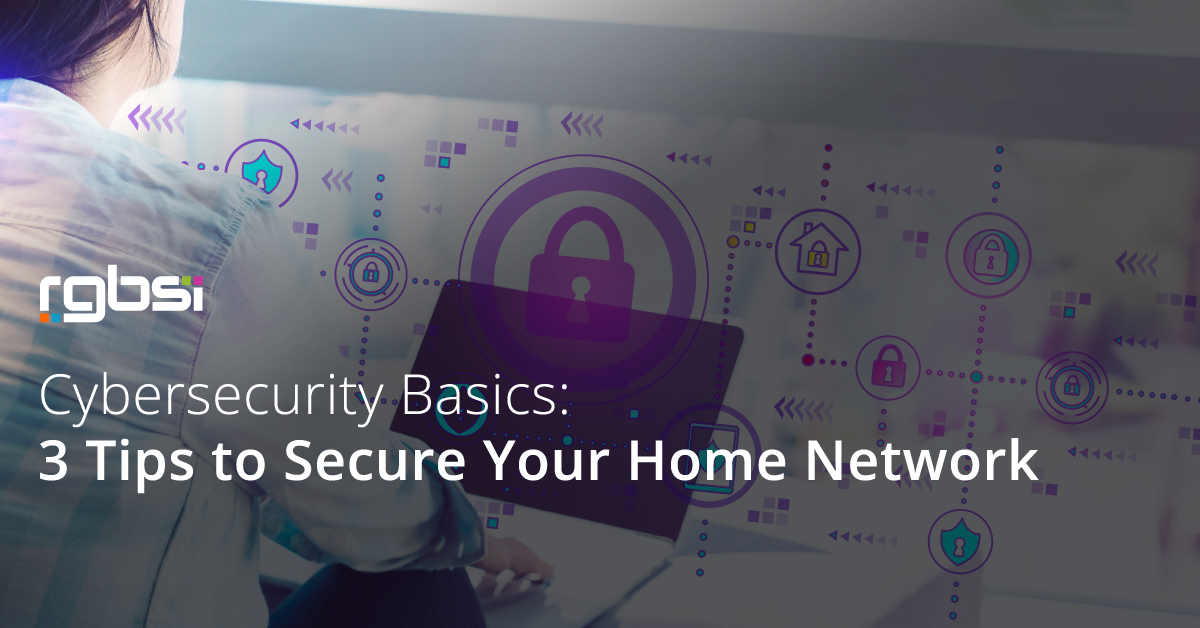
There are two networks that people use more than any others: their work network, usually robustly secured due to the risks associated with employee and client information, and their home network. Home networks are often far less secure than work networks since most simply assume that home networks have no value to opportunistic hackers. However, this is not necessarily true - if a network can be broken into without much time invested then it is worth it for these cyber criminals, as there might be valuable information to access which poses various security risks to you.
In today’s era, home networks are used for several activities such as conducting remote work and social & professional networking to more sensitive actions such as accessing banking information and making file exchanges. Therefore, it is a wise move to proactively make your home network as secure as possible. Here you'll find the cybersecurity basics in the form of 3 tips to secure your home network, making it nearly impossible for your data to get stolen.
1. Change your router's name
When you first install a router at home, you'll notice that it pops up in your computer's internet settings as a name in all capital letters and numbers. This odd name normally refers to the type of router the device is and is known as the Service Set Identifier (SSID). While this SSID is useful for diagnosing technical issues, it also provides an easy way for hackers to know what device your home internet relies on - SSIDs are unique to each type of router on the market. If you leave this SSID as your router's name, hackers may be able to find out whether it has easily accessible exploits that could allow them to enter the network unnoticed. That's why it's useful to change your router's official name to something less identifiable - a semi-unique name that you'll be able to recognize when connecting but not so unique that anyone would notice the network works best.
2. Set a router administrator password
Like with the SSIDs mentioned above, router administrator passwords are extremely generic right out of the box. Since you need to login to a company-specific website to get your router set up, the company will generally give you a username like 'admin' and a password like '123456789' to ensure that you're able to log onto that administrator website easily. But those default username-password combinations are one of the first points of attack for malicious entities. Because there are so many devices connected to these routers, finding a way to enter the main modification node (i.e., the administrator router setup website) is critical for finding information. To keep these people from entering your system, make sure you change the username and password to something unique. You may have to look up exactly how to do this as it may not be included in your router's instruction manual, but it's an imperative step to take if you want to increase your home's cybersecurity.
3. Keep connected devices up to date
Not all security measures start with your router. In fact, many other points of security concern exist within your home network - for example, a smart home device like a WIFI-connected thermostat or front door alarm. These devices all have their own built-in security measures but may be exploitable by opportunistic hackers if those measures are not robust enough. Fortunately, most of these smart device companies consistently update the software that allows these devices to connect to your home network. They do this to patch security flaws, bugs, and more. That's why it's important to allow these software updates to install regularly. If you neglect these updates, you may be using an old software version that has significant security gaps for malicious entities to exploit. If you can, try to install a form of malware detection on your devices as well. These programs are likely not available for smart home devices but certainly are for your home computers and laptops.
Check out: 7 Essential Tech Skills You Need to Have in the Workplace for simple ways to upskill your tech savviness at work..
Conclusion
Home network security is often thought of as not overly important since hackers will usually target enterprise networks before going for homes. However, important personal data is often stored on these home systems. With these 3 cybersecurity tips, you'll be well on your way to a safer home network system.
About RGBSI
At RGBSI, we deliver total workforce management, engineering, quality lifecycle management, and IT solutions that provide strategic partnership for organizations of all sizes. We leverage our expertise to fill workforce gaps and deliver full range business solutions that optimize client operations worldwide.
RGBSI's Staffing & Workforce Management Division is now Zobility.
WORK WITH Zobility
Zobility, an RGBSI brand, focuses on providing innovative talent management solutions within the mobility and high-technology sectors. Job areas include engineering, mobility, IT, computer systems, and manufacturing.
View current openings through the Zobility Job Portal.











